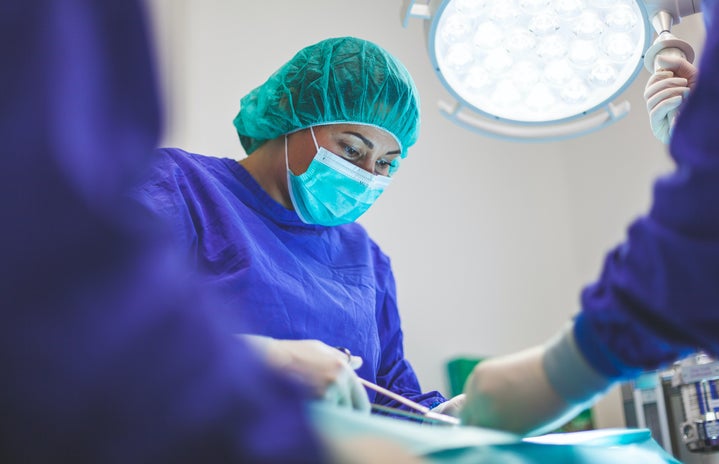It is easy to be angry at your body when you are sick and can’t seem to feel better for weeks, but what about being angry at your body for causing you pain and you don’t what is causing it? This was most of my year from September 2021 till this May. I was experiencing throbbing and pinching pain in my lower left leg when I walked for too long, stood, or ran. One doctor told me to stretch and it should go away in a couple of weeks and the other sent me through a marathon of tests. MRI, X-Ray, and a blood test later and they all showed one thing: nothing. They showed no issues but I was experiencing everything. I was being kept up from the pain and heat in my ankles when walking upstairs and now almost all exercise had to stop from the excruciating pain. I grew incredibly frustrated for months: angry at myself because I was unable to work out or go on walks. I felt embarrassed when I had to ask to sit down or explain the problem to yet another doctor. I tried every cure you can think of in the book: Advil, ice, elevation, baths, and stretching but nothing seemed to work. Physical therapy was the last resort until even my physical therapist was baffled by the pain and suggested I get tested for compartment syndrome. Finally, all my prayers were answered, and I got a diagnosis.
Compartment syndrome is a rare syndrome with less than 20,000 cases a year. This syndrome “occurs when the pressure within a compartment increases, restricting the blood flow to the area and potentially damaging the muscles and nearby nerves.” Even though I finally got the diagnosis I had been searching for, the solution wasn’t what I hoped. My only option was to get surgery: a fasciotomy. During this surgery, a doctor would make three incisions on my lower left leg, take scissors underneath my skin, and cut open all four of my compartments.
So on July 7th of this year, I had my first surgery ever. While waiting for the surgery to begin, I had multiple nurses and doctors telling me about recovery, incision sites, and even if I would need crutches or not. This syndrome is so rare that some of the hospital staff weren’t sure what I had been diagnosed with. Despite all the fear, my surgery went exceptionally well and I was sentenced to two weeks of bed rest and an estimated six-month recovery until I would be able to do all the things I used to do.
Bed rest took me through a rollercoaster of emotions I wasn’t expecting. Not only was I forced to confront my grief from the loss I had experienced two months before, but also my family had gotten COVID, sending me into another level of isolation. While binge-watching “Bridgerton”, I would see people on social media enjoying their summer and I began to feel insecure. Not only was I insecure about having the world’s crappiest summer but also about my own body. I was ashamed that my body was having so many problems and that I was left with three permanent scars as a result. My walking had completely changed for a couple of weeks because of the pain and I looked like a zombie with a cast. Even though I’m nineteen, I felt like I was two years old again. I was learning how to walk, needing help getting into the shower, and having my parents come to wake me up in the middle of the night to take my pain medication. Even though this took a huge blow to my pride and my self-image, I learned a great deal about what it means to give yourself grace.
There are many times I would cry to my friends or my parents about how frustrated I was about not being able to do my regular activities and most of them would say, “you just got surgery, doctors cut your muscles open.” Sometimes all you need is someone to validate your experience. Why was I angry at my body instead of caring for it when it so desperately needed my attention? I would look at my leg and remind myself it was in the process of healing: a medical miracle I often forget. I had access to health care, great doctors, and pain medication which isn’t accessible to all people. My leg was in the process of regrowing its own tissue and I was complaining about not going to the mall with my friends. When we get caught up in our frustrations of either little or big problems, we often lose sight of the resources we have around us. We forget about how incredibly strong we are, even when we feel the weakest. I learned a great deal about my own strength and my body’s strength and instead of feeling frustrated, I began to thank my body. Thank it for getting me through this surgery, for responding well to the medication, and for trying its absolute hardest to fight a rare syndrome. Even if it is incredibly difficult to transform frustration into gratitude, it can make all the difference in finding a new way to love yourself and even your life when it sucks the most.
I am now two months post-op with almost full mobility in my lower left leg. I am unable to jump and run still but I am no longer needing crutches and can walk almost twice as long as I was able to before the surgery. Although it is clear my left leg had gotten surgery because of the three scars, they look cool as they begin to heal. My doctors, physical therapist, and family continue to cheer on my recovery as I get closer to the finish line I have been waiting for.


